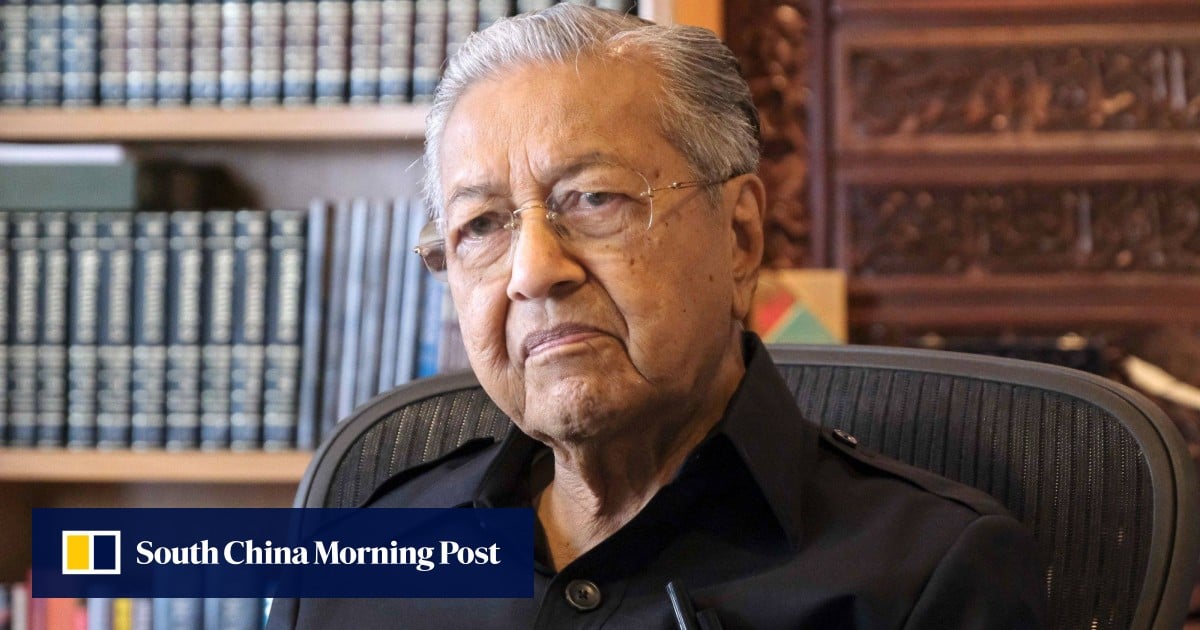◦ •With an already untouchable political legacy, the ex-premier faces mounting questions over his motivation for his new ‘Malay Proclamation’ activism
*◦ •Mahathir warns that PM Anwar’s new multiracial administration will erode the rights and privileges of Malays, who account for nearly two-thirds of voters *
Joseph Sipalan
- FOLLOW
Published: 7:45pm, 10 Jul, 2023
Mahathir Mohamad, who marked his 98th birthday on Monday, has refused to leave the political stage despite a humiliating defeat at Malaysia’s general election last year, instead returning to champion Malay rights just in time for key state polls which may challenge his nemesis – Prime Minister Anwar Ibrahim.
Soon after his former protégé Anwar rose to the premiership at the helm of a multiracial administration, Mahathir returned to his own political activism by launching a “Malay Proclamation”, to outline the “dire situation” facing the country’s ethnic Malay majority.
The document has since become a rallying point for the country’s Malay nationalists, with leaders of the Perikatan Nasional (PN) coalition – which forms a formidable and exclusively Malay opposition bench in parliament – giving their stamp of approval.
With two stints as premier and an already untouchable legacy on Malaysian politics, Mahathir is facing mounting questions over the motivation for a campaign that is bound to whip up anxiety among Malays – and Malaysia’s other religious and ethnic groups.
The answer appears to be Anwar, observers say.
“There is a side of Mahathir which is genuinely concerned with what he perceived as the erosion of Malay supremacy, which he and many Malays hold to be sacrosanct,” said Oh Ei Sun, a senior fellow at the Singapore Institute of International Affairs.
“There is also a side of Mahathir which is obsessed with hating and thus attempting to detach Anwar from the premiership. So what we are witnessing now is the interplay between these two sides of Mahathir,” he added.
**How the Mahathir-Anwar relationship shaped Malaysia’s politics **
The rancour between the two men stems from Mahathir’s decision to sack Anwar as his deputy in 1998, during his first tenure as prime minister, over disagreements on how to manage the country’s finances at the height of the Asian Financial Crisis. Anwar was eventually jailed for corruption and sodomy – charges he insists were politically motivated. Before serving time, Anwar launched his Reformasi movement that served to unite the opposition and slowly chip at the foundations of the long-ruling Umno party that Mahathir was leading at the time. Talking to reporters on Monday, Anwar showed the old enmity had not faded on his side either, describing Mahathir as desperate to remain relevant after his dismal poll showing.
“I am going to make him irrelevant,” Anwar was quoted as saying by online news portal Malaysiakini.
Mahathir is also being investigated for allegedly trying to undermine parliamentary democracy through his Malay Proclamation. Police took his statement last week.
Countless comebacks
Mahathir, a doctor with roots in the royal town of Alor Setar in northern Kedah state, attempted a comeback at the general election last November with a new party, Pejuang. But it fell flat as he failed to defend his long-held parliamentary seat on the popular holiday island of Langkawi. The usually media savvy nonagenarian went into near-radio silence before re-emerging with his “Malay Proclamation” which warned that Anwar’s new multiracial administration would erode the rights and privileges of Malays, who account for nearly two-thirds of voters.
“The Malays have already lost so much territory … [they] will disappear from their country and from the world,” Mahathir said last week.
Malays voted in droves for the Malay nationalist alliance of Bersatu and PAS amid deep-seated anger over decades of alleged corruption and mismanagement by Umno. Malaysia’s Muhyiddin, Anwar make rival claims about forming next government Public sentiment was also soured by rising living costs and prolonged financial strain caused by the pains of the Covid-19 pandemic. And with six states in the peninsula going to polls on August 12, the pressure is on Anwar and his unity government to do what they can to at least staunch the bleed in Malay support.
“What Mahathir has been doing is his way of undermining the unity government,” said Adib Zalkapli, a Malaysia director with government affairs and public policy consultancy BowerGroupAsia.
“There is no space for him to compete in the elections after a humiliating defeat at the last general election, but Mahathir is still very influential, there are segments of the Malay community that look up to him.”
While a political comeback may appear far-fetched, Mahathir continues to be well-regarded by Malays across age and class. Many older business owners are grateful for the preferential treatment that they were afforded during his earlier rule, while some youths are enamoured by the “golden age” of development under his wing.
History of angst
Mahathir has a long record of going after leaders who he deems have failed to uphold the rights and privileges of the Malays.
He had an infamously bad relationship with Malaysia’s first prime minister, Tunku Abdul Rahman, who Mahathir blamed for allowing the wealth disparity between Malays and ethnic Chinese, which officials say was the reason behind the deadly riots of May 13, 1969. When his own turn came to take the premiership, Mahathir made sure he left his mark. To date, he is the longest-serving prime minister, having spent 22 years at the helm during his first tenure from 1981 to 2003.
Described as Malaysia’s father of development, he fast-tracked Malaysia’s industrialisation as he launched the national car, oversaw the construction of modern highway networks across the peninsula and built world-renowned monuments such as the KL Twin Towers.
But critics also accused him of nepotism and rent-seeking, as well as a tendency to brook no dissent.
After stepping down from office in 2003, Mahathir continued to exert his influence, ultimately backing the rise of yet another of his proteges – Najib Razak. Ultimately, Mahathir and Najib also clashed, as the former leader balked at the new government’s attempts to liberalise the market and potentially ease pro-Malay affirmative action policies that had been in place for decades. The turning point came after news broke in 2015 about the multibillion-dollar scandal at state fund 1Malaysia Development Berhad (1MDB). Mahathir quit Umno and a year later led other leaders who were sacked or quit to form a new party, Bersatu.
With Najib behind bars, is Malaysia’s corruption fight finally winnable?
Mahathir attended Anwar’s court hearing for a second sodomy trial, ahead of formally striking a partnership with his erstwhile rival’s coalition in a bid to oust Najib and Umno from power. Mahathir’s gambit paid off in the 2018 national polls, and he returned as prime minister for a second time, albeit briefly – he fell to a political coup in 2020 orchestrated by Malay leaders in his own party and those in Umno and Islamist party PAS.
But he has said quitting politics would be “selfish” with so much relying on him.
“If I’m only thinking about myself, I will not be in politics now.”
Joseph Sipalan has done extensive reporting of Malaysia, specialising in politics and more recently macro-economics. An alumnus of Reuters and several major Malaysian news organisations


